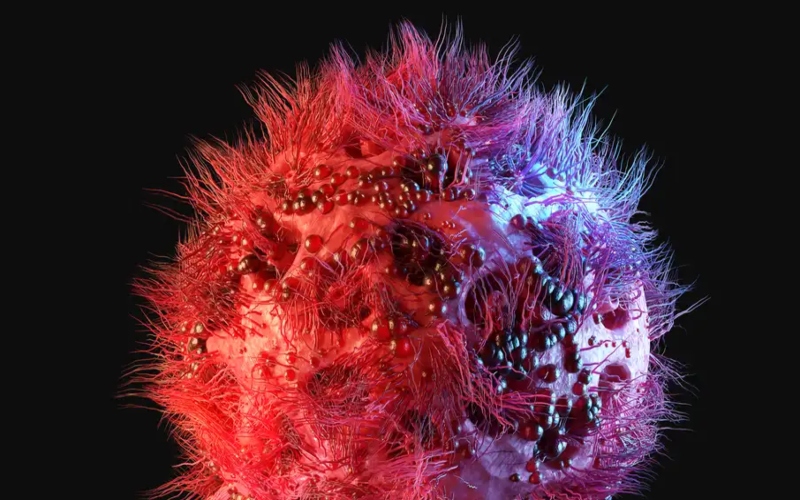Study reveals why colorectal cancer resists immunotherapy

Colorectal cancer begins in the colon or rectum, typically as small growths called polyps on the inner lining. Over time, some polyps become cancerous.
Immunotherapy has achieved remarkable success in treating certain cancers, but its effectiveness against others, such as colorectal cancer, has been limited.
Recent research published in Nature Genetics offers insight into why this is the case.
More To Read
- Study shows women under 50 face higher risk of colon growths from ultra-processed foods
- Chronic kidney disease surpasses tuberculosis and colorectal cancer in mortality rankings
- Over 100 facilities accredited by SHA to provide cancer care after protests
- Kenya wins bid to host 2027 World Cancer Leaders’ Summit
- Lancet study confirms mesothelioma risk from asbestos exposure
- Four-country study finds worrying issues with cancer drug quality in Africa
Colorectal cancer begins in the colon or rectum, typically as small growths called polyps on the inner lining. Over time, some polyps become cancerous.
According to the World Health Organisation (WHO), colorectal cancer develops when cells in the colon or rectum grow uncontrollably and may spread to other parts of the body. It is among the most common cancers globally, especially in people over 50.
Early-stage colorectal cancer often causes no symptoms. As it progresses, symptoms may include changes in bowel habits, blood in the stool, persistent abdominal pain or cramps, fatigue, unexplained weight loss, and a feeling of incomplete bowel emptying. In advanced stages, nausea and vomiting may occur.
The study found that colorectal cancer evades the immune system by constructing a “double barrier” that blocks immune cells, particularly T cells, from attacking the tumour.
The first barrier involves the hormone TGF-beta, which sends signals preventing most T cells from approaching the tumour. The second barrier targets the few T cells that do reach the tumour.
TGF-beta alters macrophages, prompting them to release osteopontin, a substance that inhibits T cell growth and multiplication. This dual defence renders the tumour nearly invisible to the immune system.
Immunotherapy is a treatment that harnesses the body’s immune system to detect and destroy cancer cells. It may involve natural or lab-made substances that boost or restore immune function. While immunotherapy has revolutionised treatment for cancers like melanoma, it has shown limited success in metastatic colorectal cancer, where most patients do not respond.
Globally, colorectal cancer causes around 1.9 million new cases and 930,000 deaths annually.
In Kenya, it accounts for approximately 1,300-1,900 new cases and 1,400 deaths each year. The study’s findings also help explain poor immunotherapy responses in other cancers, such as liver and pancreatic cancer.
Researchers from the Institute for Research in Biomedicine and the National Centre for Genomic Analysis identified the mechanisms that prevent immune cells from attacking tumours and proposed strategies to overcome these barriers.
Their work showed a clear contrast between untreated tissue, which had few T cells, and treated tissue, where the double barrier was disrupted and T cell presence increased.
For immunotherapy to work, enough T lymphocytes must reach the tumour, multiply, and move freely to eliminate cancer cells. In colorectal cancer, these conditions are disrupted by the tumour’s manipulation of its microenvironment.
The researchers used mouse models and patient samples to study how cancer spreads and how TGF-beta contributes to immune suppression. They believe this mechanism may also explain immunotherapy failure in other cancers.
Colorectal cancer is difficult to manage for several reasons. First, many cases are detected late. According to CDC data, only about one-third of colorectal cancers are found when still localised. Late-stage detection significantly reduces treatment success.
Second, survival rates vary by stage. Early detection yields much higher survival, while regional or distant spread lowers the chances of cure. The fact that many patients are diagnosed at advanced stages makes long-term survival more difficult.
Barriers to screening and timely care also hinder outcomes. The CDC notes that screening methods like colonoscopy or stool-based tests are effective in detecting and preventing colorectal cancer by identifying and removing precancerous polyps. Yet many people are not up to date on screening.
Once the disease is advanced, treatment becomes more complex and less likely to be curative. In metastatic colorectal cancer, the focus often shifts to prolonging life and maintaining quality. Factors such as age, overall health, tumour biology, and treatment delays can further compromise effectiveness.
This research highlights a major obstacle in cancer treatment and points to new strategies that could help immune cells better reach and fight tumours, potentially improving outcomes for patients with colorectal and other resistant cancers.
Top Stories Today











































